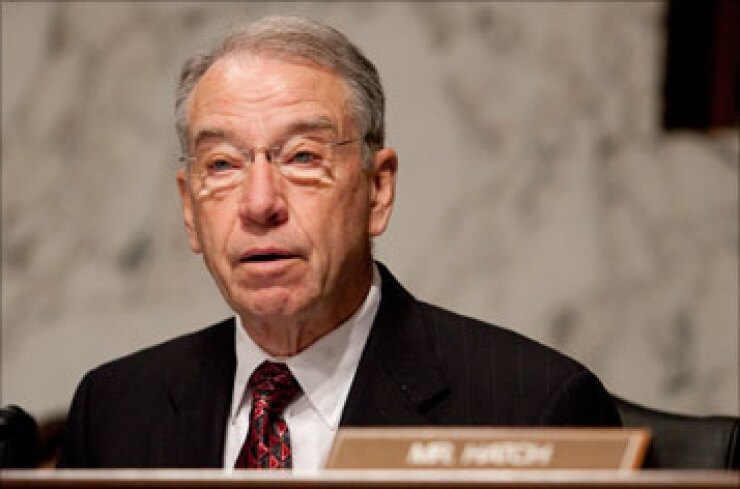
WASHINGTON — The Securities and Exchange Commission would be able to impose much higher penalties on individuals and entities that violate securities laws under bipartisan legislation proposed on Thursday in the Senate.
The bill, called the Stronger Enforcement of Civil Penalties Act of 2017, was introduced by Sens. Jack Reed, D-R.I., Chuck Grassley, R-Iowa, Patrick Leahy, D-Vt., and Heidi Heitkamp, D-N.D. It was referred to the Senate Banking Committee.
Under the bill, individuals charged with the most serious securities law violations would face a penalty that would be the greater of: $1 million; three times the monetary gain; or the losses incurred by the victims of the violation, according to a description released by the senators. Entities charged with those serious violations would face a penalty that is the greater of: $10 million; three times the monetary gain; or the losses the victims of the violations incurred.
The SEC would also be able to triple its fines against recidivists that have committed criminal or civil securities fraud within the previous five years.
Grassley said he welcomes the increased penalties for repeat offenders that the bill would provide.
"That step should help change the dynamic of business as usual," he said. "A penalty should mean something, and it should get the recidivists' attention."
The SEC can currently only penalize violators in cases up to $181,071 per offense for individuals and $905,353 for institutions, according to the release on the bill. The SEC can also calculate penalties to equal the amount of ill-gotten gains if the enforcement action is filed in federal court, but cannot do so if it is filed in an administrative proceeding. The legislation would allow the SEC to assess the penalties for cases in both federal court and administrative proceedings.
"This bill strives to make potential and current offenders think twice before engaging in misconduct by increasing the maximum civil monetary penalties permitted by statute, directly linking the size of the maximum penalties to the amount of losses suffered by victims of a violations, and substantially raising the financial stakes for repeat offenders of our nation's securities laws," the senators said in their joint release.
Reed said that "investors deserve real protection, and the law needs to change to ensure the punishment fits the crime."
"This bill gives the SEC more tools to demand meaningful accountability from Wall Street," he said.
The maximum penalties under the bill for each second tier violation of securities laws would be the greater of $100,000 or the total monetary gain for individuals and the greater of $500,000 or the total monetary gain for entities. First tier violations, the least serious of the three tiers, would be the greater of $10,000 or the total monetary gain for individuals and the greater of $100,000 or the total monetary gain for entities.
The bill would also give the SEC authority to pursue civil penalties for violations of prior injunctions obtained under the securities laws. Each violation of an injunction or order would be deemed a separate offense, but in the event of a continuing failure to comply, each day of continued failure would be considered a separate offense.





